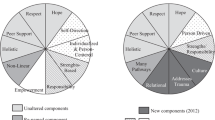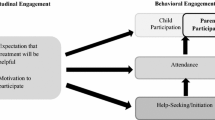Abstract
Purpose
Understanding how resources are used provides guidance to disseminating effective interventions. Here, we report data on implementation resources needed for the Rural Breast Cancer Survivors (RBCS) study that tested a telephone-delivered psychoeducational education and support intervention to survivors in rural Florida. Intervention resources included interventionists’ time on one intake assessment (IA) call, three education calls (ED), one follow-up education call (FUE), six support (SUP) calls, and documentation time per survivor.
Methods
Interventionists logged start and end times of each type of call. Average interventionist time in minutes was calculated by call type. Associations between interventionists’ time and participants’ characteristics including age, race/ethnicity, time since treatment, cancer treatment, depressive symptoms, education, income, employment, and support, was assessed using linear mixed models with repeated measures.
Results
Among 328 survivors, IA calls lasted 66.9 min (SD 21.7); ED lasted 50.6 (SD 16.7), 48.1 (SD 15.9), and 39.6 (SD 14.8); FUE lasted 24.7 (SD 14.8); and SUP 42.8 (SD 29.6) min. Documentation time was 18.4 min for IA, 23–27 for ED, 12.3 for FUE, and 23.0 for SUP.
Conclusion
Interventionists spent significantly more time with participants with depressive symptoms, who already used other support, and who received SUP calls before the ED vs. after. There were no significant differences by time since or type of cancer treatment, or other personal characteristics.
Implications for Cancer Survivors
Resources vary by survivor characteristics. Careful consideration of mental health status or support available is warranted for planning implementation and dissemination of effective survivorship interventions on a broad scale.

Similar content being viewed by others
References
Glasgow RE, Vinson C, Chambers D, Khoury MJ, Kaplan RM, Hunter C. National Institutes of Health approaches to dissemination and implementation science: current and future directions. Am J Public Health. 2012;102(7):1274–81.
Mandelblatt JS, Cullen J, Lawrence WF, et al. Economic evaluation alongside a clinical trial of psycho-educational interventions to improve adjustment to survivorship among patients with breast cancer. J Clin Oncol. 2008;26(10):1684–90.
Stanton AL, Ganz PA, Kwan L, et al. Outcomes from the moving beyond cancer psychoeducational, randomized, controlled trial with breast cancer patients. J Clin Oncol. 2005;23(25):6009–18.
Neta G, Glasgow RE, Carpenter CR, et al. A framework for enhancing the value of research for dissemination and implementation. Am J Public Health. 2015;105(1):49–57.
Ribisl KM, Leeman J, Glasser AM. Pricing health behavior interventions to promote adoption: lessons from the marketing and business literature. Am J Prev Med. 2014;46(6):653–9.
Meneses K, McNees P, Loerzel VW, Su X, Zhang Y, Hassey LA. Transition from treatment to survivorship: effects of a psychoeducational intervention on quality of life in breast cancer survivors. Oncol Nurs Forum. 2007;34(5):1007–16.
Galway K, Black A, Cantwell M, Cardwell CR, Mills M, Donnelly M. Psychosocial interventions to improve quality of life and emotional wellbeing for recently diagnosed cancer patients. Cochrane Datab of Syst Rev. 2012;11:CD007064.
Glasgow RE, Vogt TM, Boles SM. Evaluating the public health impact of health promotion interventions: the RE-AIM framework. Am J Public Health. 1999;89(9):1322–7.
Meneses K, McNees P, Azuero A, Loerzel VW, Su X, Hassey LA. Preliminary evaluation of psychoeducational support interventions on quality of life in rural breast cancer survivors after primary treatment. Cancer Nurs. 2009;32(5):385–97.
Florida Department of Health. Office of Rural Health, Rural population by U.S. census tract. Tallahassee, FL. Retrieved at: http://www.floridahealth.gov.
McNees P, Meneses K. Index of research access. Nurs Res Rev. 2012;3:5–7.
Meneses K, Benz R, Hassey L, Yang Z, McNees P. Strategies to retain rural breast cancer survivors in longitudinal research. Appl Nurs Res. 2013;26(40):257–62.
Radloff L. The CES-D scale: a self-report depression scale for research in the general population. Appl Psych Meas. 1977;1(3):385–401.
Meneses K, Azuero A, Hassey L, McNees P, Pisu M. Does economic burden influence quality of life in breast cancer survivors? Gynecol Oncol. 2012;124(3):437–43.
Pisu M, Azuero A, Meneses K, Burkhardt J, McNees P. Out of pocket cost comparison between Caucasian and minority breast cancer survivors in the Breast Cancer Education Intervention (BCEI). Breast Canc Res Tr. 2011;127(2):521–9.
Given BA, Given CW, Stommel M. Family and out-of-pocket costs for women with breast cancer. Cancer Pract. 1994;2(3):187–93.
Sherbourne C, Stewart AL. The MOS social support survey. Soc Sci Med. 1991;32:705–14.
Meneses K, Azuero A, Su X, Benz R, McNees P. Predictors of attrition among rural breast cancer survivors. Res Nurs Health. 2014;37(1):21–31.
SAS. v9.4 Statistical Software. SAS Institute, Inc., Cary, North Carolina. Available at: http://www.sas.com/en_us/software/sas9.html.
Stagl JM, Antoni MH, Lechner SC, et al. Randomized controlled trial of cognitive behavioral stress management in breast cancer: a brief report of effects on 5-Year depressive symptoms. Health Psychol. 2014;34(2):176–80.
Kroenke K, Theobald D, Wu J, Norton K, Morrison G, Carpenter J, et al. Effect of telecare management on pain and depression in patients with cancer: a randomized trial. JAMA. 2010;304(2):163–71. doi:10.1001/jama.2010.944.
Acknowledgments
The authors thank the breast cancer survivor participants who generously gave their time.
Acknowledgments and disclosure
The Florida cancer incidence data used in this report were collected by the Florida Cancer Data System under contract with the Department of Health (DOH). The views expressed herein are solely those of the authors and do not necessarily reflect those of the contractor or DOH.
Conflict of interest
The authors declare that they have no conflict of interest
Funding source
This study was supported by the National Institute of Nursing Research (R01NR-01185-03) and the National Cancer Institute (RO1CA-120638-07).
Author information
Authors and Affiliations
Corresponding author
Additional information
Previous presentation of the manuscript: 2014 Biennial Cancer Survivorship Conference
Rights and permissions
About this article
Cite this article
Pisu, M., Meneses, K., Azuero, A. et al. Variation in resources needed to implement psychosocial support interventions for rural breast cancer survivors. J Cancer Surviv 10, 375–383 (2016). https://doi.org/10.1007/s11764-015-0483-6
Received:
Accepted:
Published:
Issue Date:
DOI: https://doi.org/10.1007/s11764-015-0483-6




